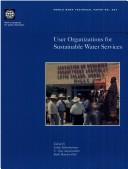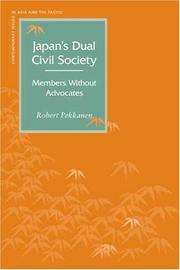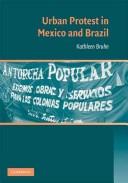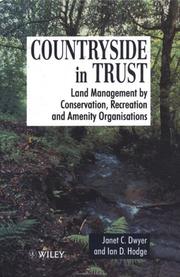| Listing 1 - 10 of 10 |
Sort by
|
Book
ISBN: 0674041372 9780674041370 9780674030794 0674030796 Year: 2008 Publisher: Cambridge, Mass. Harvard University Press
Abstract | Keywords | Export | Availability | Bookmark
 Loading...
Loading...Choose an application
- Reference Manager
- EndNote
- RefWorks (Direct export to RefWorks)
Ever since Alexis de Tocqueville published his observations in Democracy in America, Americans have recognized the distinctiveness of their voluntary tradition. In a work of political, legal, social, and intellectual history, Neem traces the origins of this venerable tradition to the vexed beginnings of American democracy in Massachusetts.
Civil society --- Citizens' associations --- Democracy --- Self-government --- Political science --- Equality --- Representative government and representation --- Republics --- Block associations --- Block clubs --- Citizen associations --- Neighborhood associations --- Residents' committees --- Taxpayers' associations --- Associations, institutions, etc. --- Neighborhood government --- Social contract --- History. --- Massachusetts --- Politics and government --- History --- United States --- 1775-1865

ISBN: 0700607870 Year: 1996 Publisher: Lawrence Univ. press of Kansas
Abstract | Keywords | Export | Availability | Bookmark
 Loading...
Loading...Choose an application
- Reference Manager
- EndNote
- RefWorks (Direct export to RefWorks)
#SBIB:35H1362 --- #SBIB:324H50 --- #SBIB:AANKOOP --- Organisatie en beleid: lokale besturen: Verenigde Staten --- Politieke participatie en legitimiteit (referenda, directe democratie, publieke opinie...) --- Citizens' associations --- Neighborhood government --- Political participation --- Citizen participation --- Community action --- Community involvement --- Community participation --- Involvement, Community --- Mass political behavior --- Participation, Citizen --- Participation, Community --- Participation, Political --- Political activity --- Political behavior --- Government, Neighborhood --- Neighborhood associations --- Neighborhood councils --- Block associations --- Block clubs --- Citizen associations --- Residents' committees --- Taxpayers' associations --- Political rights --- Social participation --- Political activists --- Politics, Practical --- Local government --- Associations, institutions, etc.

ISBN: 0821338552 Year: 1997 Publisher: Washington, D.C.
Abstract | Keywords | Export | Availability | Bookmark
 Loading...
Loading...Choose an application
- Reference Manager
- EndNote
- RefWorks (Direct export to RefWorks)
Citizens' associations --- Irrigation projects --- Sanitation --- Water utilities --- #SBIB:35H200 --- #SBIB:35H501 --- #SBIB:AANKOOP --- Water companies --- Public utilities --- Water-supply --- Cleanliness --- House drainage --- Sanitary affairs --- Sanitation services --- Sanitation systems --- Environmental health --- Hygiene --- Public health --- Sanitary engineering --- Projects, Irrigation --- Agricultural development projects --- Block associations --- Block clubs --- Citizen associations --- Neighborhood associations --- Residents' committees --- Taxpayers' associations --- Associations, institutions, etc. --- Neighborhood government --- Management&delete& --- Citizen participation --- Overheidsmanagement: algemene werken --- Bestuur en samenleving: netwerken, inspraak, participatie, interactief beleid --- Water supply. Water treatment. Water pollution --- Management
Book
ISBN: 9070280930 Year: 1993 Publisher: Amsterdam CEDLA
Abstract | Keywords | Export | Availability | Bookmark
 Loading...
Loading...Choose an application
- Reference Manager
- EndNote
- RefWorks (Direct export to RefWorks)
Against the background of the ongoing debate on 'urban social movements' in Brazil, this study aims to reconstruct the development of neighbourhood associations in the north-eastern city of Recife (Pernambuco) between 1964 and 1988.
Citizens' association --- -Community organization --- -Neighborhood --- -Social movements --- Urban renewal --- -Community development --- Community development --- Regional development --- Economic assistance, Domestic --- Social planning --- Model cities --- Renewal, Urban --- Urban redevelopment --- Urban renewal projects --- City planning --- Land use, Urban --- Urban policy --- Movements, Social --- Social history --- Social psychology --- Neighborhood --- Neighbourhoods --- Communities --- CBOs (Community organization) --- Community-based organizations --- Community councils --- Community life --- Citizen participation --- Government policy --- Citizens' associations --- Community organization --- Neighborhoods --- Social movements --- Citizen participation. --- Block associations --- Block clubs --- Citizen associations --- Neighborhood associations --- Residents' committees --- Taxpayers' associations --- Associations, institutions, etc. --- Neighborhood government

ISBN: 9780804754293 0804754292 0804754284 9780804754286 Year: 2006 Publisher: Stanford : Stanford University Press,
Abstract | Keywords | Export | Availability | Bookmark
 Loading...
Loading...Choose an application
- Reference Manager
- EndNote
- RefWorks (Direct export to RefWorks)
J4100 --- J4210 --- J4600.90 --- Civil society --- -Associations, institutions, etc --- -Citizens' associations --- Non-governmental organizations --- -Nonprofit organizations --- -Japan --- -Block associations --- Block clubs --- Citizen associations --- Neighborhood associations --- Residents' committees --- Taxpayers' associations --- Associations, institutions, etc. --- Neighborhood government --- Corporations, Nonprofit --- Non-profit organizations --- Non-profit sector --- Non-profits --- Nonprofit sector --- Nonprofits --- Not-for-profit organizations --- NPOs --- Organizations, Nonprofit --- Tax-exempt organizations --- INGOs (International agencies) --- International non-governmental organizations --- NGOs (International agencies) --- Nongovernmental organizations --- Organizations, Non-governmental (International agencies) --- Private and voluntary organizations (International agencies) --- PVOs (International agencies) --- International agencies --- Nonprofit organizations --- Institutions, associations, etc. --- Networks (Associations, institutions, etc.) --- Organizations --- Voluntary associations --- Voluntary organizations --- Social groups --- Voluntarism --- Social contract --- Japan: Sociology, anthropology and culture in general --- Japan: Sociology and anthropology -- social policy and pathology --- Japan: Politics and law -- history -- postwar Shōwa (1945- ), Heisei period (1989- ), contemporary --- Politics and government --- Associations, institutions, etc --- Citizens' associations --- Block associations --- Japan

ISBN: 9780415402378 0415402379 9780203961728 9781134143146 9781134143184 9781134143191 9780415547079 Year: 2007 Publisher: Milton Park, Abingdon, Oxon ; New York : Routledge,
Abstract | Keywords | Export | Availability | Bookmark
 Loading...
Loading...Choose an application
- Reference Manager
- EndNote
- RefWorks (Direct export to RefWorks)
City planning --- Urban policy --- Environmental policy --- Urban renewal --- Citizens' associations --- Urban ecology (Sociology) --- Community development, Urban --- Urbanisme --- Politique urbaine --- Environnement --- Rénovation urbaine --- Comités de citoyens --- Ecologie urbaine --- Développement communautaire urbain --- Citizen participation. --- Participation des citoyens --- Politique gouvernementale --- J4010 --- J4192 --- J6580 --- Model cities --- Renewal, Urban --- Urban redevelopment --- Urban renewal projects --- Land use, Urban --- Cities and state --- Urban problems --- City and town life --- Economic policy --- Social policy --- Sociology, Urban --- Cities and towns --- Civic planning --- Redevelopment, Urban --- Slum clearance --- Town planning --- Urban design --- Urban development --- Urban planning --- Land use --- Planning --- Art, Municipal --- Civic improvement --- Regional planning --- Community programs, Urban --- Neighborhood improvement programs --- Urban community development --- Urban economic development --- Block associations --- Block clubs --- Citizen associations --- Neighborhood associations --- Residents' committees --- Taxpayers' associations --- Associations, institutions, etc. --- Neighborhood government --- Citizen participation --- Japan: Social sciences in general -- ideology, socio-political and socio-economic movements --- Japan: Sociology and anthropology -- communities -- urban groups, the city --- Japan: Art and antiquities -- urban planning --- Government policy --- Management --- Social aspects

ISBN: 9780511509988 9780521881296 9780511388248 0511388241 0511386222 9780511386220 0511509987 0521881293 1107184924 9781107184923 0511384394 9780511384394 9786611254919 6611254919 0511382588 9780511382581 1281254916 9781281254917 0511387253 9780511387258 0511380410 9780511380419 Year: 2008 Publisher: Cambridge New York Cambridge University Press
Abstract | Keywords | Export | Availability | Bookmark
 Loading...
Loading...Choose an application
- Reference Manager
- EndNote
- RefWorks (Direct export to RefWorks)
Why do social organizations decide to protest instead of working through institutional channels? This book draws hypotheses from three standard models of contentious political action - POS, resource mobilization, and identity - and subjects them to a series of qualitative and quantitative tests. The results have implications for social movement theory, studies of protest, and theories of public policy/agenda setting. The characteristics of movement organizations - type of resources, internal leadership competition, and identity - shape their inherent propensity to protest. Party alliance does not constrain protest, even when the party ally wins power. Instead, protest becomes a key part of organizational maintenance, producing constant incentives to protest that do not reflect changing external conditions. Nevertheless, organizations do respond to changes in the political context, governmental cycles in particular. In the first year of a new government, organizations have strong incentives to protest in order to establish their priority in the policy agenda.
Protest movements --- Municipal officials and employees --- Citizens' associations --- Political parties --- Civil service, Municipal --- Municipal civil service --- Municipal employees --- Municipal officers --- Town officers --- Civil service --- Local officials and employees --- Public officers --- Parties, Political --- Party systems, Political --- Political party systems --- Political science --- Divided government --- Intra-party disagreements (Political parties) --- Political conventions --- Block associations --- Block clubs --- Citizen associations --- Neighborhood associations --- Residents' committees --- Taxpayers' associations --- Associations, institutions, etc. --- Neighborhood government --- Social movements --- Labor unions --- Political activity --- Mexico City (Mexico) --- São Paulo (Brazil) --- Tenochtitlán (Mexico) --- Temestitán (Mexico) --- Temixtitan (Mexico) --- Mexiko Stadt (Mexico) --- Ciudad de México (Mexico) --- City of Mexico (Mexico) --- CDMX (Mexico) --- メキシコシティー (Mexico) --- Mekishikoshitī (Mexico) --- Distrito Federal (Mexico) --- Politics and government. --- Mégico (Mexico) --- Social Sciences --- Political Science --- Sao Paulo (Brazil)

ISBN: 0471948713 Year: 1996 Publisher: Chichester ; New York ; Toronto John Wiley and Sons
Abstract | Keywords | Export | Availability | Bookmark
 Loading...
Loading...Choose an application
- Reference Manager
- EndNote
- RefWorks (Direct export to RefWorks)
Citizens' associations --- Land trusts --- Landscape protection --- Nature conservation --- Comités de citoyens --- Conservation de la nature --- Societies, etc --- -Landscape protection --- -Nature conservation --- -719 landschapsbescherming --- 504 milieu --- 504 milieubeleid --- 504 milieubeleidsovereenkomsten --- 504 MiNa-Raad --- 504 VMM --- Conservation of nature --- Nature --- Nature protection --- Protection of nature --- Conservation of natural resources --- Applied ecology --- Conservation biology --- Endangered ecosystems --- Natural areas --- Beautification of the landscape --- Conservation of landscapes --- Conservation of scenic beauty --- Conservation of scenic resources --- Landscape --- Natural beauty conservation --- Preservation of natural scenery --- Preservation of scenic resources --- Protection of landscapes --- Protection of scenic beauty --- Protection of scenic resources --- Scenery preservation --- Environmental protection --- Environmentally sensitive areas --- Landscape assessment --- Regional planning --- Land use, Rural --- Real property --- Trusts and trustees --- Block associations --- Block clubs --- Citizen associations --- Neighborhood associations --- Residents' committees --- Taxpayers' associations --- Associations, institutions, etc. --- Neighborhood government --- Conservation --- Protection --- Law and legislation --- Comités de citoyens --- Great Britain --- Societies, etc. --- Nature conservation - Great Britain. --- Land trusts - Great Britain. --- Nature conservation - Great Britain - Societies, etc. --- Landscape protection - Great Britain - Societies, etc. --- Citizens' associations - Great Britain. --- 719 landschapsbescherming
Book
ISBN: 0804782032 9780804782036 9780804775656 9780804775649 0804775648 0804775656 Year: 2012 Publisher: Palo Alto Stanford University Press
Abstract | Keywords | Export | Availability | Bookmark
 Loading...
Loading...Choose an application
- Reference Manager
- EndNote
- RefWorks (Direct export to RefWorks)
Most social science studies of local organizations tend to focus on "civil society" associations, voluntary associations independent from state control, whereas government-sponsored organizations tend to be theorized in totalitarian terms as "mass organizations" or manifestations of state corporatism. Roots of the State examines neighborhood associations in Beijing and Taipei that occupy a unique space that exists between these concepts.Benjamin L. Read views the work of the neighborhood associations he studies as a form of "administrative grassroots engagement."
Beijing (China) - Politics and government. --- Beijing (China) -- Politics and government. --- Citizens' associations - China - Beijing. --- Citizens' associations - Taiwan - Taipei. --- Citizens' associations -- China -- Beijing. --- Citizens' associations -- Taiwan -- Taipei. --- Neighborhood government - China - Beijing. --- Neighborhood government -- China -- Beijing. --- Neighborhood government - Taiwan - Taipei. --- Neighborhood government -- Taiwan -- Taipei. --- Social networks - China - Beijing. --- Social networks -- China -- Beijing. --- Social networks - Taiwan - Taipei. --- Social networks -- Taiwan -- Taipei. --- Taipei (Taiwan) - Politics and government. --- Taipei (Taiwan) -- Politics and government. --- Neighborhood government --- Citizens' associations --- Social networks --- Networking, Social --- Networks, Social --- Social networking --- Social support systems --- Support systems, Social --- Interpersonal relations --- Cliques (Sociology) --- Microblogs --- Block associations --- Block clubs --- Citizen associations --- Neighborhood associations --- Residents' committees --- Taxpayers' associations --- Associations, institutions, etc. --- Government, Neighborhood --- Neighborhood councils --- Local government --- S06/0225 --- S11/0497 --- China: Politics and government--People's Republic: local and provincial government: since 1976 --- China: Social sciences--Society since 1976 --- Beijing (China) --- Taipei (Taiwan) --- Taibei (Taiwan) --- Taihoku-shi (Taiwan) --- Taipeh (Taiwan) --- Tai bei (Taiwan) --- Tʻai-pei shih (Taiwan) --- Tʻai-pei (City) --- Tʻai-pei (Taiwan) --- Taipe (Taiwan) --- Taipak (Taiwan) --- Taibei Shi (Taiwan) --- Tʻai-pei shih cheng fu (Taiwan) --- Taibei Shi zheng fu (Taiwan) --- Taipei City Government (Taiwan) --- Taipei Municipal Government (Taiwan) --- Taipei City (Taiwan) --- Taipei Municipality (Taiwan) --- 臺北 (Taiwan) --- 臺北市 (Taiwan) --- Beijing Shi (China) --- Begejing (China) --- Begejing Qota (China) --- Bėėzhin (China) --- Бээжин (China) --- Peiping (China) --- Peping (China) --- Pekin (China) --- Pei-ching shih (China) --- Pei-pʻing shih (China) --- Peking (China) --- Pukkyŏng (China) --- Beijing Municipality (China) --- Bei Jing Shi (China) --- Pei-ching (China) --- Pechino (China) --- Pequim (China) --- Peiping Municipal Administrative Area (China) --- Peiping Municipality (China) --- Peking Municipality (China) --- Bījīn (China) --- Dadu (China) --- Daidu (China) --- 北京 (China) --- Beiping Tebieshi zheng fu --- Beiping Shi zheng fu --- Beiping Shi di fang wei chi hui --- Beijing di fang wei chi hui --- Beijing Tebieshi zheng fu --- Beijing Tebieshi gong shu --- Beijing Shi ren min zheng fu --- Beijing Shi ren min wei yuan hui --- Beijing Shi ge ming wei yuan hui --- Politics and government.

ISBN: 0520926471 1597346896 9780520926479 9780520227422 0520227425 9780520227439 0520227433 9781597346894 058542523X 9780585425238 Year: 2002 Publisher: Berkeley, Cal. University of California Press
Abstract | Keywords | Export | Availability | Bookmark
 Loading...
Loading...Choose an application
- Reference Manager
- EndNote
- RefWorks (Direct export to RefWorks)
Do racial minorities in the United States assimilate to American values and institutions, or do they retain ethnic ties and cultures? In exploring the Japanese American experience, Lon Kurashige recasts this tangled debate by examining what assimilation and ethnic retention have meant to a particular community over a long period of time. This is an inner history, in which the group identity of one of America's most noteworthy racial minorities takes shape. From the 1930's, when Japanese immigrants controlled sizable ethnic enclaves, to the tragic wartime internment and postwar decades punctuated by dramatic class mobility, racial protest, and the influx of economic investment from Japan, the story is fraught with conflict. The narrative centers on Nisei Week in Los Angeles, the largest annual Japanese celebration in the United States. The celebration is a critical site of political conflict, and the ways it has changed over the years reflect the ongoing competition over what it has meant to be Japanese American. Kurashige reveals, subtly and with attention to gender issues, the tensions that emerged at different moments, not only between those who emphasized Japanese ethnicity and those who stressed American orientation, but also between generations and classes in this complex community.
Japanese Americans --- Ethnic festivals --- Citizens' associations --- Festivals --- Kibei Nisei --- Nisei --- Ethnology --- Japanese --- Block associations --- Block clubs --- Citizen associations --- Neighborhood associations --- Residents' committees --- Taxpayers' associations --- Associations, institutions, etc. --- Neighborhood government --- Social life and customs --- Social conditions --- Ethnic identity --- History --- Los Angeles (Calif.) --- Los Anheles (Calif.) --- Pueblo de Nuestra Señora la Reina de los Angeles de Porciuncula (Calif.) --- Town of Our Lady the Queen of the Angels of Porciuncula (Calif.) --- Tʻien-shih-chih-chʻeng (Calif.) --- Tianshizhicheng (Calif.) --- Los Andzsheles (Calif.) --- Lo-shan-chi (Calif.) --- Loshanji (Calif.) --- Angeles (Calif.) --- Ciudad de Los Angeles (Calif.) --- Pueblo de Los Angeles (Calif.) --- Pueblo Los Angeles (Calif.) --- City of Los Angeles (Calif.) --- LA (Calif.) --- L.A. (Calif.) --- City of Angels (Calif.) --- لوس أنجلوس (Calif.) --- Lūs Anjilūs (Calif.) --- Los Anceles (Calif.) --- Горад Лос-Анджэлес (Calif.) --- Horad Los-Andz︠h︡ėles (Calif.) --- Лос-Анджэлес (Calif.) --- Los-Andz︠h︡ėles (Calif.) --- Лос Анджелис (Calif.) --- Los Andzhelis (Calif.) --- Λος Αντζελες (Calif.) --- Los Antzeles (Calif.) --- Los-Anĝeleso (Calif.) --- 로스앤젤레스 (Calif.) --- Losŭ Aenjellesŭ (Calif.) --- לוס אנג'לס (Calif.) --- Angelopolis (Calif.) --- Losandželosa (Calif.) --- Los Andželas (Calif.) --- Лос Анџелес (Calif.) --- Los Andželes (Calif.) --- ロサンゼルス (Calif.) --- Rosanzerusu (Calif.) --- ロサンゼルス市 (Calif.) --- Rosanzerusu-shi (Calif.) --- Los Anjeles (Calif.) --- Лос Андьелес (Calif.) --- Los Andʹeles (Calif.) --- Los Anxheles (Calif.) --- Лос Анђелес (Calif.) --- Our Lady Queen of the Angels (Calif.) --- Los Angeles City (Calif.) --- La La Land (Calif.) --- Ethnic relations. --- Social conditions. --- Descriptive sociology --- Social history --- Sociology --- 1930s. --- american history. --- asian american. --- asian history. --- assimilation. --- cultural studies. --- culture. --- economics. --- economy. --- ethnicity. --- gender issues. --- gender studies. --- historical. --- internment camps. --- japan. --- japanese american. --- japanese immigrants. --- los angeles. --- nisei week. --- political. --- politics. --- postwar. --- race. --- racial minorities. --- racism. --- united states history. --- united states. --- us history. --- wartime.
| Listing 1 - 10 of 10 |
Sort by
|

 Search
Search Feedback
Feedback About UniCat
About UniCat  Help
Help News
News